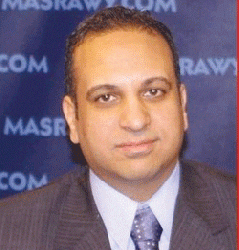DETROIT - As the Muslim Brotherhood’s Mohammed Morsi became Egypt’s new leader June 24, defeating the country’s former Prime Minister Ahmed Shafiq, in a historic presidential election, Egyptians around the world signaled relief over the end of an era consumed by tyranny, and the start of a new one that holds much promise.

|
| Ahmed Ghanim |
For Ahmed Ghanim, an Egyptian American who arrived in the United States 10 years ago and millions of other Egyptians, the events of Egypt’s revolution which are part of the popular Arab Spring uprisings that toppled former Egyptian President Hosni Mubarak, who ruled Egypt with an iron fist for more than three long decades are surreal.
Before the revolution Egyptians and Arabs in other countries such as Syria where uprisings have occurred, could have never imagined openly protesting against their government on the streets or poking fun at law enforcement officials.
“Now people are not afraid to say they don’t like the president of a country, they can hold a sign and protest against the government without fear. We have never seen anything like this,” Ghanim said. “That is something I’ve never seen… Before the revolution started you couldn’t even say down with a police officer.”
Morsi is the first Islamist president of Egypt. He defeated his opponent former Egyptian Prime Minister Ahmed Shafiq, who was a symbol of the regime Egyptians died to oust more than a year ago. According to reports Morsi won with 51.7 percent of the vote as opposed to Shafiq who received 48.3 percent.
Thousands celebrated Morsi’s victory in Tahrir Square last Sunday. Ghanim says while Egyptians might not be pleased about who won the election; they all agree the country is better off without Mubarak.

|
| Dr. Ola Elsaid |
“Most want the change,” Ghanim says. Dr. Ola Elsaid, an Egyptian American who came to the United States in 1995 and has relatives in Egypt, says the country is definitely better without Mubarak’s regime.
Dr. Elsaid says before the revolution people could easily be arrested for unjustified reasons. “There were no limits to the tyranny,” she said.
She says Egyptians saw the revolution coming even before the popular Arab Spring uprisings struck across the Arab World, noting that people had become fed up with the corrupt government of Mubarak.
The death of 28-year–old Khaled Mohamed Saeed is widely known to have sparked the revolution in Egypt. He died in 2010, then in 2011 two Egyptian officers were found guilty of manslaughter and sentenced to seven years in prison for beating him to death after he had done nothing criminal. Photos of his corpse spread, and he became known as the face that launched the revolution. “The injustice was growing to the point were people couldn’t take it anymore,” Dr. Elsaid said. Ghanim says he left Egypt because of the oppression there. He remembers not being able to run for student body president because of it. The international community is expressing concern about having an Islamist as president, and raising concern about the implications it would have on women’s rights and religious minorities such as Coptic Christians.
Dr. Elsaid says Western media has highly exaggerated the effects an Islamist leader would have. She said Morsi is simply more religious when it comes to following the peaceful tenets of Islam. Mubarak’s regime was accused of creating tensions between Muslims and Christians.
Dr. Elsaid believes Christians and other minorities will actually have more rights. “Oppression is not part of the Islamic faith…If he’s following the teaching of Islam he will be afraid to harm Christians and other minorities because he will have to answer to God on judgment day,” she said. Dr. Elsaid says in addition to Western media, Egyptian media has also portrayed the Muslim Brotherhood negatively.
For decades the Muslim Brotherhood and Mubarak’s regime were at odds with one another, and Egyptian media favored Mubarak’s regime, often smearing the Muslim Brotherhood’s image in order to prevent it from coming to power.
There are reports that Christians will be included as members of the newly formed government.
Currently a new constitution is being drafted. Dr. Elsaid says one of the possible initiatives the Muslim Brotherhood could try to pursue is banning alcohol publicly, because it’s prohibited in Islam.
The Muslim Brotherhood was part of the revolution according to Ghanim. “They defended the revolution, they were part of the revolution, and they helped the revolution succeed,” he said.
If Egyptians feel dissatisfied with the Muslim Brotherhood in the future, it wouldn’t be surprising if they tried to topple it too. “Now that the revolution started, we the people know how to change the regime,” Ghanim said.






Leave a Reply